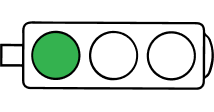Width of Focus
I know virtually nothing about technology, but I think I understand the concept of bandwidth. There is a vast amount of information surrounding us and traveling electronically in every direction imaginable. In order to send and receive that information, you have to ensure that your business, home, or any location where you happen to be has ample bandwidth so that the information can travel as quickly and effectively as possible.
I could equate this concept to our transportation grid and talk about the facilitation of traffic, but I figure that I already use traffic and my frustration with it in enough articles and essays.
What I will equate it to is the width of your own focus. The need for focus, your ability to concentrate on a particular subject or event in order to direct your attention and develop a clear vision of what is occurring, is an absolutely essential piece of forward progress and strong decision making.
Without focus, you will not only be unable to understand what is going on, but also unable to do anything about it. Think about it. Everything you have ever accomplished in your life began with your focus.
When you learned to walk, you began the process by focusing on your parents or your siblings and then concentrating your effort to replicate what you saw them doing.
Your progression through school was predicated on your ability to focus on the material in front of you and what your teacher was presenting to you.
As you get older, the role that focus plays in your forward progress tends to evolve. If you are able to recognize that and fine tune your focus to keep up with that evolution, your forward progress will continue.
When you make progress and gain experience, your focus will need to widen to incorporate the additional responsibilities that are part and parcel to your progress and experience. This does not mean that you can allow your focus to not be as sharp. It means that it must be just as sharp as it always has been across a wider spectrum.
This is where it can really get tricky because your focus must be narrow enough to identify what is immediately in front of you and deserving of your attention, but not so narrow that you lose sight of your surroundings.
The center of your focus must be concentrated on the things that are most important to you, but not so much so that your peripheral vision is blurred to the point that you lose sight of what is important to those around you.
So, what are some things that you can do to make sure that the width of your focus properly reflects your stage of life, your responsibilities, and your intended future path?
Start with a healthy dose of self-discipline, which will immediately help you to make sure that you strike an effective balance between what you see and how you act. Self-discipline involves creating your own personalized mental checklist that will help you identify the key components that tie your external surroundings to your internal processing.
If you identify something (a penny on the sidewalk, a coupon for a product that you don’t use) that is not worth your time or energy, you will decide not to focus on it and to not take any action involving it.
If, however, you become aware of something (a job posting, an upcoming concert) that does merit your attention, you will decide to focus on it and determine a set of actions that will help you turn that focus into a desired outcome.
The self-discipline part of this keeps you on your personal path by helping you to make decisions that best represent the amount of focus you have assigned to the matter. When you exercise self-discipline and seek balance in your thoughts and actions, you will also be a lot more likely to assign the appropriate weight to the items that may or may not warrant your focus.
The temptation of taking a short cut will be offset by the realization that you will stand to lose more than you gain in so doing. While it may be perfectly acceptable to ignore your diet plan on occasion, doing so over and over again will cause your plan to be useless and your health to deteriorate.
Conversely, the road to that promotion you desire may extract a price in the form of your time and commitment, but the gain will make that time and commitment worthwhile.
You already know that there are plenty of distractions out there. They come in all shapes and sizes and are not necessarily harmful at the right time and under the right circumstances, but distractions that dilute your focus over an extended period of time will cause a major derailment in your plans for forward progress and future success.
Just as it is a good idea to get a regular eye exam in order to check your vision, it is a good idea take a step back on a regular basis in order to make sure that you are focused on the right things.
Are you spending time on the things that really matter? Have you considered all options, including any non-standard alternatives? Are you having fun? How close are you to where you thought you would be?
Jumping back to the bandwidth example; if you have too little, potentially vital information will not get through. If you have too much, you are overpaying for capacity and resource that could be used elsewhere. The importance of the width of your focus is no different.
Keep it tuned up by exercising your self-discipline, utilizing your personal mental checklist, striking a balance in your decision making, and assigning the proper amount of weight between your potential action and the consequence for that action. From there, take some time to review and re-evaluate as necessary.
Scott Arney
Chief Executive Officer
Chicago Patrolmen’s Federal Credit Union






